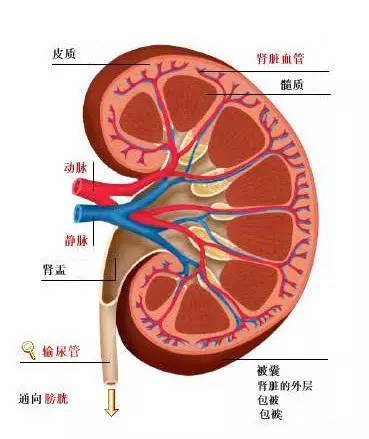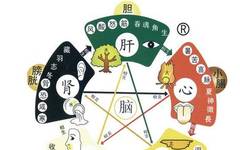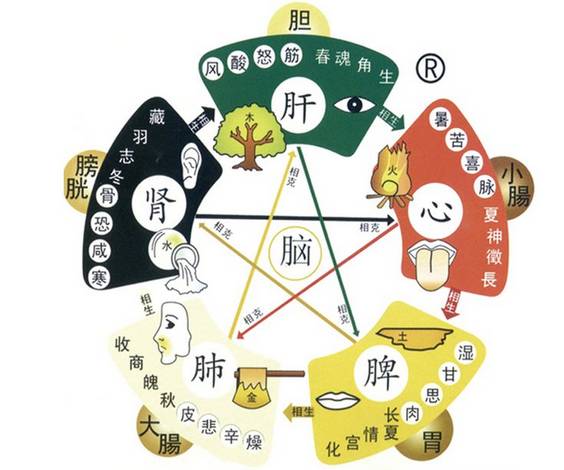
1. The “Liver General” Fears Blockage
“The liver wood generates and grows, just like trees.” According to TCM theory, the liver is the general organ, characterized by its role in regulating and dispersing. It thrives in a state of smooth flow and dislikes stagnation. Only when the liver is unrestrained can the body achieve a relaxed and free state, akin to a tree with sprawling branches. However, the following bad habits often lead to “blockages” in the liver.
1Excessive Alcohol Consumption: Heavy drinking increases the burden on the liver to detoxify, and if the liver cannot detoxify in time, it can lead to pathological changes, resulting in alcoholic liver disease,cirrhosis, and liver cancer.2
Emotional Distress: TCM believes the liver governs anger, thrives in smooth flow, and regulates dispersal. If a person remains in a state ofdepression for a long time, their qi cannot be released, which can harm the liver.
3Staying Up Late: An adult should ideally sleep for 8 hours, with the best time for liver care being from 11 PM to 3 AM.4Obesity: Reduce intake of greasy foods to avoid the accumulation of difficult-to-digest fats in the liver, which can lead to fatty liver, and in severe cases, tocirrhosis and liver cancer.5Irregular Medication Use: The liver is the body’s largest detoxification organ, and most medications must be metabolized by the liver. Therefore, medications can increase the liver’s burden, leading to drug-induced liver damage, which can be severe enough to cause liver failure and even threaten life.
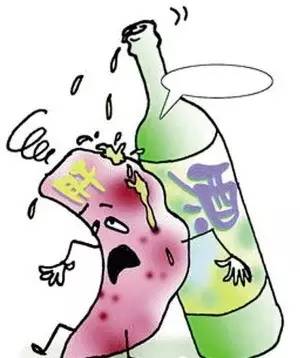
2. The “Heart Monarch” Fears Fatigue
The heart governs blood vessels, and its qi drives and regulates blood circulation throughout the body, nourishing and moistening it. It is a very yang organ, akin to a monarch. When heart qi is abundant, the complexion is rosy. Conversely, symptoms such as chest pain and weakened heart qi may arise. Therefore, certain “heart-harming” bad habits require special attention.
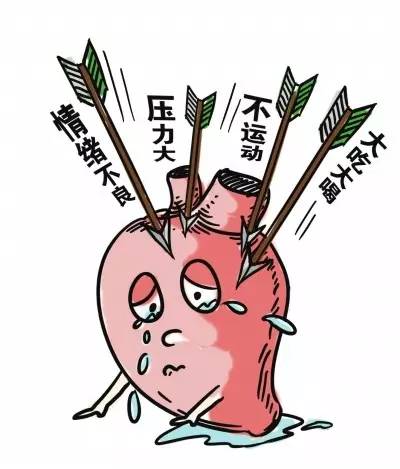
1. Riding in Busy Areas
In densely populated areas, whether cycling, driving, or walking, it places a significant burden on the heart due to the severe air pollution from vehicle emissions. The longer one stays, the greater the harm. These individuals inhale the most exhaust while also exerting physical effort, which can lead to insufficient blood supply.
2. Sudden Strain
Exerting too much force suddenly, such as during bowel movements or lifting heavy objects, can put the heart in a tense state, significantly burdening it, causing a sudden increase in blood pressure, which may lead to plaque rupture and thrombosis. Individuals who are sedentary, hypertensive, elderly, or have a history of heart disease should avoid sudden exertion.
3. Emotional Depression
Negative emotions can severely harm the heart, especially depression, which significantly affects sleep quality, preventing the heart from resting well. Over time, blood pressure and heart rate may rise, leading to an excessive burden on the heart and increasing the risk of heart disease.
4. Excessive Alcohol or Coffee Consumption
Excessive drinking or coffee consumption can lead to increased heart rate and blood pressure. Chronic alcohol abuse can severely damage the myocardium, leading to heart failure. Generally, adult males should limit beer to 750 ml per day, and low-alcohol spirits, high-alcohol spirits, and wine to 75 ml, 50 ml, and 250 ml, respectively.
5. Smoking or Secondhand Smoke
Smokers have a threefold risk of myocardial infarction compared to non-smokers. The risk of heart attack decreases within 24 hours of quitting smoking, and after one year, the risk of heart disease is reduced by 50%.
6. Binge Eating
After a large meal, the digestive system requires a significant amount of blood to process food, reducing blood flow to the heart and brain, which greatly increases the risk of myocardial infarction and cerebral infarction for those with cardiovascular issues. Long-term overeating can lead to obesity, and fat can cause atheromatous plaques in blood vessels, resulting in strokes and coronary heart disease.
7. High Salt Intake
Excessive salt intake raises blood pressure and increases cholesterol levels, promoting atherosclerosis.
8. Frequent Sexual Activity
Frequent sexual activity keeps the heart in a constant state of excitement, which can lead to spasms and myocardial ischemia, resulting in heart failure.
9. Drug Use
Individuals who use cocaine have a 23-fold increased risk of heart disease.
10. Sedentary Lifestyle
Prolonged sitting alters metabolism, affects fat metabolism, reduces enzyme activity, increases fat and triglyceride levels in the blood, raises blood viscosity, slows blood flow, and increases the risk of heart disease.
3. The Spleen and Stomach Dislike Cold
“The spleen and stomach are the roots of health. TCM believes the spleen and stomach are the “foundation of postnatal life,” highlighting their importance.” In TCM, the spleen refers to both the spleen and pancreas, and they are often treated as a whole. Food must be transformed by the spleen to become essence, which nourishes the five organs and six bowels.
1. Overindulging in Cold Drinks
Cold harms the spleen, commonly manifesting as a white, greasy tongue coating, with mild cases leading to abdominal pain and diarrhea, and severe cases causing nausea and vomiting.
2. Excessive Air Conditioning
Many people experience abdominal pain or diarrhea in air-conditioned or fan environments, which is related to external cold invading the spleen and stomach.
3. Exposing the Abdomen
The navel is a crucial acupuncture point known as “Shenque,” which is associated with the Mingmen point. Exposing the abdomen can allow cold pathogens to invade these important points, harming not only the spleen and stomach but also the kidneys and bones.
4. Drinking Too Much Cool Tea
Authentic cool tea contains cooling herbs such as chrysanthemum, honeysuckle, and lotus leaf, which can help clear heat. However, for individuals with a weak and cold spleen and stomach, excessive consumption of cool tea can be detrimental. Cool tea should not be consumed long-term, especially for women during menstruation, pregnant women, postpartum women, and children.
5. Skipping Staple Foods
TCM states, “Grains are nourishment.” Skipping staple foods can weaken the spleen and stomach. If appetite is poor, one can consume appetizing foods like Sichuan pickles or make nourishing porridge, such as mung bean and coix seed porridge, yam and lentil rice porridge, or sweet potato and oatmeal porridge.
6. Eating Only Raw Vegetables
Cold dishes are cooling and hard to digest, which harms the spleen and stomach.
7. Spicy and Heavy Flavors
Eating spicy foods can help eliminate dampness, stimulate appetite, and awaken the spleen, but excessive consumption can irritate the mucous membranes of the mouth, esophagus, and stomach, easily causing stomach fire and mouth sores. In such cases, one can drink mung bean soup or eat watermelon to clear heat.
8. Excessive Alcohol Consumption
Alcohol also irritates the stomach lining and increases the burden on the liver, which is extremely detrimental to the spleen and stomach.
9. Irregular Eating Patterns
The spleen and stomach prefer a regular lifestyle. Eating at fixed times and chewing slowly is key to maintaining the spleen and stomach. If one frequently skips meals or eats on the go, it will inevitably weaken the spleen and stomach, increasing the risk of gastritis and gastric ulcers.
10. Staying Up Late
Staying up late harms yin, leading to yin deficiency and qi deficiency, which not only harms the spleen and stomach but also affects all five organs. To maintain health, one must sleep well at night, ideally not later than 11 PM, and take a half-hour nap at noon.
4. The Lungs Fear Poor Environment
The lungs act like a large umbrella, covering the five organs and six bowels. When lung qi is harmonious, the qi mechanism flows smoothly, allowing the five organs to function normally. The strength of lung qi is also related to lifespan.
1Long-term Smoking: Tobacco has a strong irritant effect, and both TCM and Western medicine agree that smoking severely harms the lungs.2
Staying Too Long in Poor Air Quality: The lungs have high environmental requirements; fresh air is their favorite. Staying too long in areas with dense exhaust and smoke can provoke the lungs.
3Excessive Sadness: As recorded in the “Neijing,” excessive sadness can severely damage lung function.
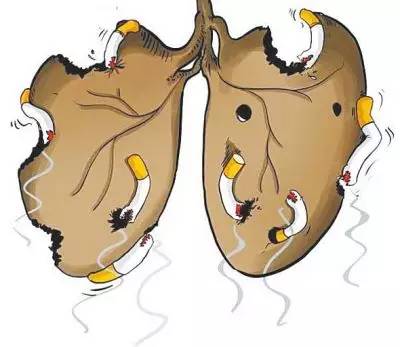
5. The Kidneys Fear Dehydration
The kidneys govern water and store essence, serving as the regulatory center for life activities. Kidney essence determines growth, development, and reproduction. Therefore, protecting the kidneys requires avoiding the following bad habits.
1Excessive Salt Intake: TCM states that salty flavors enter the kidneys, and when vital energy is deficient, the taste preference becomes heavier.2
Not Drinking Enough Water: Many people dislike drinking water, which can significantly harm the kidneys.
3Excessive Nightlife: Staying up late and engaging in activities like all-night singing can harm the kidneys, leading to kidney yin damage and causing internal heat. Prolonged excitement can result in fatigue and lethargy afterward.
